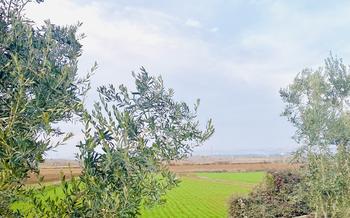
Eskişehir Japanese Garden
- The Wonder of Japan in the Heart of Turkey
- A Serene Oasis in a Bustling City
- The Beauty of Water in Japanese Culture
- Traditional Japanese Architecture
- The Art of Bonsai
- Tea Ceremony and Japanese Hospitality
- Japanese Cuisine and Culinary Delights
- Cultural Events and Festivals
- Educational Programs and Workshops
- Souvenirs and Shopping
- Photography and Instagrammability
- Family-Friendly Activities and Play Areas
- Accessibility and Facilities
- Insider Tip: Hidden Gem in the Garden
The Wonder of Japan in the Heart of Turkey
In the heart of the vibrant city of Eskişehir, Turkey, lies a hidden gem that transports visitors to the serene landscapes and rich culture of Japan. The Eskişehir Japanese Garden is a remarkable representation of Japanese aesthetics and a symbol of the deep friendship and cooperation between Turkey and Japan. Established in 1993 as a gift from the Japanese government, the garden has become a beloved destination for locals and tourists alike, offering a tranquil oasis amidst the bustling urban surroundings.
To reach this enchanting garden, visitors can take a leisurely stroll from the city center or conveniently hop on a public bus. Once inside, they are greeted by a serene atmosphere that instantly whisks them away to the tranquility of Japan. The garden's location within walking distance from the city's main attractions makes it an easily accessible retreat for those seeking a moment of peace and a glimpse into Japanese culture.
A Serene Oasis in a Bustling City
Amidst the vibrant energy of Eskişehir, the Japanese Garden stands as a tranquil sanctuary, inviting visitors to escape the hustle and bustle of city life. Step through its gates and be transported to a world of serenity, where the sounds of the city fade away, replaced by the gentle rustling of leaves and the calming trickle of water. The garden's meticulously manicured landscapes, with their lush greenery, serene ponds, and traditional Japanese elements, create an atmosphere of peace and tranquility that envelops the senses. It is a place where visitors can reconnect with nature, find solace, and immerse themselves in the beauty of Japanese aesthetics. Whether seeking a moment of respite, practicing meditation, or simply appreciating the wonders of nature, the Eskişehir Japanese Garden offers a unique and rejuvenating experience for all who visit.
The Beauty of Water in Japanese Culture
In Japanese culture, water holds a profound significance, symbolizing purity, renewal, and life. This reverence for water is reflected in the design of the Eskişehir Japanese Garden, where water features play a central role in creating a serene and harmonious environment. Visitors are greeted by the gentle sound of flowing water as they enter the garden, setting the tone for a tranquil experience.
Throughout the garden, water is incorporated in various forms, from serene ponds and cascading waterfalls to meandering streams and bubbling fountains. The ponds, teeming with colorful koi fish, provide a vibrant contrast to the lush greenery and offer a glimpse into the vibrant underwater world. The waterfalls, with their gentle roar, create a sense of movement and energy, adding a touch of dynamism to the tranquil setting.
The streams, meandering through the garden's paths, symbolize the flow of life and serve as a reminder of the interconnectedness of all things. The bubbling fountains, with their playful dance of water droplets, add a touch of whimsy and delight to the garden's atmosphere. The incorporation of water features in the Eskişehir Japanese Garden not only enhances its aesthetic appeal but also serves as a reminder of the deep cultural and philosophical significance of water in Japanese culture.
Traditional Japanese Architecture
Japanese architecture, with its emphasis on simplicity, harmony, and the use of natural materials, plays a crucial role in creating a sense of balance and tranquility within the Eskişehir Japanese Garden. The garden features various traditional Japanese buildings, each showcasing unique architectural elements.
-
Teahouses: Visitors can step into the serene teahouses, characterized by their tatami-matted floors, sliding doors, and overhanging eaves. These teahouses provide a tranquil setting for experiencing the traditional Japanese tea ceremony, a ritual that embodies harmony, respect, and mindfulness.
-
Pavilions: Scattered throughout the garden are exquisite pavilions, offering shelter from the sun or rain. These structures often feature intricate wooden carvings and are strategically placed to provide breathtaking views of the garden's landscapes.
-
Gates: Traditional Japanese gates, known as torii, mark the entrances to different sections of the garden. These gates, with their distinctive curved shape and vermilion color, symbolize the transition from the mundane world to the sacred realm of the garden.
The Art of Bonsai
Bonsai, the art of cultivating miniature trees in containers, holds a special place in Japanese culture as a symbolic representation of nature in miniature. In the Eskişehir Japanese Garden, visitors can admire a collection of bonsai trees that showcase the skill and dedication of Japanese horticulturalists.
These miniature masterpieces come in various shapes and sizes, each one a unique work of art. From the stately pines that evoke the grandeur of ancient forests to the delicate cherry blossoms that symbolize the transience of life, each bonsai tree tells a story. Visitors can learn about the different techniques used to create and maintain bonsai, such as pruning, wiring, and repotting.
Beyond their aesthetic beauty, bonsai trees hold deep philosophical and symbolic meanings. They represent the Japanese values of patience, perseverance, and the appreciation of small things. By cultivating these miniature trees, bonsai practitioners cultivate a sense of mindfulness and connection with nature.
As you stroll through the garden, take a moment to pause and admire the bonsai collection. Reflect on the symbolism and philosophy behind these miniature trees and appreciate the artistry and dedication that goes into their creation.
Tea Ceremony and Japanese Hospitality
The Japanese tea ceremony is an integral part of Japanese culture, embodying the principles of harmony, respect, and mindfulness. At the Eskişehir Japanese Garden, visitors can experience an authentic tea ceremony in a traditional teahouse, immersing themselves in the rituals and customs of this ancient tradition.
During the tea ceremony, guests are served matcha tea, a finely ground green tea, in a serene and tranquil setting. The tea master, dressed in traditional kimono, performs a series of graceful movements, preparing and serving the tea with meticulous attention to detail.
Participants are encouraged to embrace the spirit of the tea ceremony, focusing on the present moment and appreciating the simplicity and beauty of the ritual. The teahouse provides a sanctuary for reflection and contemplation, allowing visitors to connect with Japanese culture on a deeper level.
Whether you are a seasoned tea enthusiast or a first-time visitor, the tea ceremony at the Eskişehir Japanese Garden offers a unique opportunity to learn about Japanese traditions and experience the essence of Japanese hospitality.
Japanese Cuisine and Culinary Delights
Japanese cuisine, renowned for its freshness, delicate flavors, and artistic presentation, is an integral part of the Japanese cultural experience. At the Eskişehir Japanese Garden, visitors can savor the authentic flavors of Japan in the garden's traditional restaurant.
The menu features a variety of dishes, including sushi, tempura, and udon noodles, all prepared with the finest ingredients and presented with meticulous care. Visitors can indulge in the delicate flavors of sushi, with its fresh fish and perfectly cooked rice, or savor the crispy texture and light batter of tempura. For a hearty meal, the udon noodles, served in a flavorful broth, are a must-try.
Beyond the culinary delights, Japanese cuisine holds deep cultural significance. Food is an integral part of Japanese hospitality and social customs, symbolizing generosity, respect, and mindfulness. Sharing a meal together is considered a special occasion, and the preparation and presentation of food are imbued with cultural meaning.
For an immersive culinary experience, visitors can participate in a traditional Japanese tea ceremony, where they can learn about the history, etiquette, and symbolism of this ancient ritual. The tea ceremony is a unique opportunity to not only taste the delicate flavors of matcha tea but also to gain a deeper understanding of Japanese culture and traditions.
Whether indulging in a delicious meal at the garden's restaurant or participating in a tea ceremony, visitors to the Eskişehir Japanese Garden are sure to be captivated by the authentic flavors and cultural insights that Japanese cuisine has to offer.
Cultural Events and Festivals
The Eskişehir Japanese Garden is not just a place of tranquility and beauty; it is also a hub of cultural exchange and understanding. Throughout the year, the garden hosts a variety of cultural events and festivals that showcase the rich traditions and arts of Japan.
One of the most popular events is the cherry blossom festival, held in the spring when the garden's cherry trees burst into full bloom. Visitors can stroll beneath the delicate pink blossoms, enjoy traditional Japanese music and dance performances, and savor delicious Japanese cuisine.
Another highlight is the summer festival, which features traditional Japanese games, workshops, and performances. Visitors can try their hand at calligraphy, origami, or traditional dance lessons, and experience the lively atmosphere of a Japanese summer festival.
The autumn moon festival, held in the fall, celebrates the beauty of the autumn moon and the changing seasons. Visitors can enjoy moon viewing, traditional Japanese music and dance performances, and sample seasonal Japanese dishes.
These cultural events and festivals provide an excellent opportunity for visitors to immerse themselves in Japanese culture, learn about Japanese traditions, and experience the warmth and hospitality of the Japanese people.
Educational Programs and Workshops
The Eskişehir Japanese Garden offers a range of educational programs and workshops that provide visitors with the opportunity to immerse themselves in Japanese culture and arts. These programs are designed to foster cultural appreciation and understanding among visitors of all ages.
Calligraphy workshops introduce participants to the art of Japanese calligraphy, teaching them the basic techniques and strokes needed to create beautiful characters. Origami classes explore the art of paper folding, allowing participants to create intricate and delicate origami figures. Traditional dance lessons provide an introduction to Japanese dance forms, such as Bon Odori and Yosakoi, offering participants a glimpse into the vibrant and expressive world of Japanese dance.
These educational programs and workshops are led by experienced instructors who share their knowledge and passion for Japanese culture with participants. They provide a unique opportunity for visitors to learn about Japanese traditions, art forms, and customs firsthand, creating a deeper understanding and appreciation for Japanese culture.
Souvenirs and Shopping
Within the confines of the garden lies a treasure trove of Japanese souvenirs and handicrafts, waiting to be discovered in the charming gift shop. From traditional clothing that exudes elegance and sophistication to exquisite ceramics and lacquerware that showcase Japanese craftsmanship, the gift shop offers a diverse selection of items that capture the essence of Japanese culture.
These souvenirs are not mere trinkets; they are tangible pieces of Japanese artistry and tradition that visitors can take home to cherish. Whether it's a delicate kimono adorned with vibrant motifs, a set of intricately painted ceramic teacups, or a beautifully crafted lacquerware box, each item carries a story and invites the owner to delve deeper into the rich tapestry of Japanese culture.
Shopping in the garden's gift shop is not just a transactional experience; it's an opportunity to connect with Japanese aesthetics and craftsmanship. Visitors can engage with the friendly staff, who are always delighted to share insights into the significance and symbolism behind each item. Whether you're looking for a unique gift for a loved one or a special memento for yourself, the garden's gift shop promises an unforgettable shopping experience.
Photography and Instagrammability
The Eskişehir Japanese Garden is not only a tranquil sanctuary but also a paradise for photography enthusiasts. Its picturesque beauty and Instagrammable corners make it a popular spot for capturing stunning photos. Whether you're an amateur photographer or a seasoned pro, the garden offers endless opportunities to unleash your creativity.
From the vibrant cherry blossoms in spring to the fiery autumn colors, the garden's natural beauty is a feast for the eyes. Capture the delicate petals of the cherry blossoms against the backdrop of traditional Japanese architecture, or embrace the vibrant hues of the autumn foliage that paint the garden in a mesmerizing tapestry of colors.
Don't miss the opportunity to immortalize the garden's unique features, such as the serene ponds, cascading waterfalls, and meticulously manicured landscapes. Experiment with different angles and perspectives to capture the essence of the garden's tranquility and harmony.
Remember to respect the garden's environment and follow responsible photography practices. Avoid disturbing the wildlife, and be mindful of other visitors who are seeking a peaceful experience. Embrace the beauty of the moment, and let your photos convey the serene essence of this Japanese oasis in the heart of Turkey.
Family-Friendly Activities and Play Areas
The Eskişehir Japanese Garden is not just a place for adults to relax and appreciate nature; it also offers a variety of activities and play areas that make it a great destination for families with children. The garden features several playgrounds with swings, slides, and other equipment where kids can run, climb, and play to their heart's content. There are also sandboxes where children can build castles and dig for buried treasures.
Additionally, the garden's water features, such as ponds and streams, provide endless opportunities for exploration and play. Children can splash in the water, skip rocks, or simply enjoy watching the fish swim by. The garden's staff is also very friendly and helpful, and they are always willing to assist families with any questions or needs they may have.
Overall, the Eskişehir Japanese Garden is a wonderful place for families to spend a day together, enjoying the beauty of nature, engaging in fun activities, and creating lasting memories.
Accessibility and Facilities
The Eskişehir Japanese Garden is committed to creating an inclusive and welcoming environment for visitors of all abilities. The garden is wheelchair accessible, with ramps, elevators, and designated parking spaces available for visitors with disabilities. Restrooms, lockers, and a first-aid station are also located throughout the garden for the convenience of visitors. The garden staff is friendly and accommodating, always willing to assist visitors with any questions or needs they may have. Whether you are a person with a disability, a senior, or a family with young children, you can be assured that the Eskişehir Japanese Garden is a place where everyone can enjoy and appreciate the beauty of Japanese culture and nature.
Personal Experience: During my visit to the garden, I noticed that the staff went above and beyond to assist a family with a young child who had special needs. The staff provided the family with a wheelchair and helped them navigate the garden's paths and facilities. It was heartwarming to see how the staff's attentiveness and care made the family's visit to the garden a positive and enjoyable experience.
Insider Tip: Hidden Gem in the Garden
Beyond the main attractions of the Eskişehir Japanese Garden, there lies a hidden gem that is often overlooked by visitors. Nestled amidst the lush greenery and tranquil waters, this secret spot offers a unique and enchanting experience.
To find this hidden gem, venture off the beaten path and follow a winding path that leads you deeper into the garden's heart. As you approach, you will hear the gentle sound of a hidden waterfall cascading over rocks. The air becomes cooler and filled with the mist, creating a mystical atmosphere.
Emerging from the path, you will find yourself in a secluded clearing surrounded by towering trees and vibrant flowers. At the center of this hidden oasis is a small teahouse, its traditional architecture blending seamlessly with the natural surroundings.
Take a moment to sit on the tatami mats and savor the tranquility of this hidden gem. Sip on a cup of freshly brewed matcha tea and let the serene atmosphere wash away your worries. As you relax and soak in the beauty of your surroundings, you will feel a deep connection to nature and the essence of Japanese culture.
Remember to respect the sanctity of this hidden gem and leave it as you found it, so that future visitors can also experience its magic.









